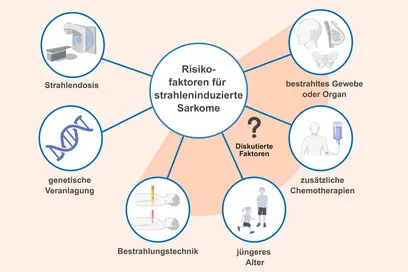Bösartige Tumoren haben meist die Fähigkeit verloren, sich durch den programmierten Zelltod Apoptose selbst zu zerstören. Daher ist der Krebs oft gegen Chemo- und Strahlentherapien resistent, deren Wirkung darauf beruht, die Tumorzellen in den Selbstmord zu treiben. Verantwortlich für diese Apoptose-Resistenz sind Defekte in einem der zahlreichen molekularen Schalter, die den Selbsttötungsprozess regulieren. Wissenschaftler versuchen daher seit langem, in Krebszellen die Bildung der Schalter und damit die Apoptosefähigkeit wiederherzustellen. Eines der wichtigsten dieser Schaltmoleküle ist CD95 auf der Zelloberfläche, das durch Bindung seines Partners CD95L aktiviert wird. Dies löst eine ganze Kaskade von biochemischen Signalen aus, die zum Tod der Zelle führt.
Im Deutschen Krebsforschungszentrum untersuchte Dr. Ana Martin-Villalba mit ihrer Arbeitsgruppe die Funktion von CD95 auf Zellen des Glioblastoms. Bei diesem extrem bösartigen Hirntumor versagen alle Therapien: Der Krebs wächst korallenstockartig mit feinsten Ausläufern in umgebendes Hirngewebe ein, einzelne, isolierte Tumorzellen dringen sogar noch weiter vor. So haben Chirurgen keine Chance, das Tumorgewebe restlos zu entfernen. Darüber hinaus ist das Glioblastom hochresistent gegen Chemo- und Strahlentherapien.
Martin-Villalbas Team fand auf Zellen des Glioblastoms große Mengen von CD95; CD95L tritt dagegen vor allem an der so genannten Invasionsfront auf, wo das Tumorgewebe an gesundes Hirngewebe angrenzt. Trotz der Anwesenheit beider Moleküle sind die Zellen resistent gegen den programmierten Zelltod. Aber nicht nur das: Wird CD95 auf der Oberfläche der Glioblastomzellen durch CD95L aktiviert, führt dies zur Bildung des Proteins MMP9, das als molekulare Schere bekannt ist. MMP9 durchschneidet die netzartig verwobenen Proteinfasern, die verschiedene Gewebeschichten des Körpers voneinander abgrenzen. Mithilfe dieser Proteinschere bahnen sich Tumorzellen den Weg in gesundes Gewebe und bilden so die gefährlichen Ausläufer, die tief ins Gehirngewebe vordringen.
Das Ergebnis zeigte den Wissenschaftlern einen Weg auf, die Invasion des Glioblastoms zu stoppen: Sie behandelten Mäuse, denen Glioblastome transplantiert worden waren, mit einem Antikörper, der CD95 blockiert. Daraufhin kam die Wanderung der Krebszellen zum Erliegen.
“Das ist fast ein Paradigmenwechsel“, sagt Ana Martin-Villaba. “Bisher galt es immer, die Ausbildung von CD95 und CD95L in Tumorzellen zu fördern. Beim Glioblastom müssen wir nun davor warnen: So würde die Ausbreitung des Tumors nur zusätzlich begünstigt. Das Ziel ist eher, die Aktivierung von CD95 zu blockieren.“ Dieser therapeutische Ansatz kann derzeit jedoch noch nicht beim Menschen untersucht werden, da noch kein brauchbarer Antikörper gegen das CD95-Protein des Menschen zur Verfügung steht.
Susanne Kleber, Ignacio Sancho-Martinez, Benedict Wiestler, Alexandra Beisel, Christian Gieffers, Oliver Hill, Meinolf Thiemann, Wolf Müller, Jaromir Sykora, Nina Schreglmann, Elisabeth Letellier, Cecilia Zuliani, Stefan Klussmann, Marcin Teodorczyk, Hermann-Josef Gröne, Tom M. Ganten, Holger Sültmann, Jochen Tüttenberg, Andreas von Deimling, Anne Regnier-Vigouroux, Christel Herold-Mende und Ana Martin-Villalba: Yes and PI3K bind CD95 to signal invasion of Glioblastoma. Cancer Cell, 11. März 2008
Über das DKFZ
Das Deutsche Krebsforschungszentrum (DKFZ) ist mit mehr als 3.000 Mitarbeiterinnen und Mitarbeitern die größte biomedizinische Forschungseinrichtung in Deutschland. Wissenschaftlerinnen und Wissenschaftler erforschen im DKFZ, wie Krebs entsteht, erfassen Krebsrisikofaktoren und suchen nach neuen Strategien, die verhindern, dass Menschen an Krebs erkranken. Sie entwickeln neue Methoden, mit denen Tumoren präziser diagnostiziert und Krebspatienten erfolgreicher behandelt werden können. Beim Krebsinformationsdienst (KID) des DKFZ erhalten Betroffene, Interessierte und Fachkreise individuelle Antworten auf alle Fragen zum Thema Krebs.
Um vielversprechende Ansätze aus der Krebsforschung in die Klinik zu übertragen und so die Chancen von Patientinnen und Patienten zu verbessern, betreibt das DKFZ gemeinsam mit exzellenten Universitätskliniken und Forschungseinrichtungen in ganz Deutschland Translationszentren:
- Nationales Centrum für Tumorerkrankungen (NCT, 6 Standorte)
- Deutsches Konsortium für Translationale Krebsforschung (DKTK, 8 Standorte)
- Hopp-Kindertumorzentrum (KiTZ) Heidelberg
- Helmholtz-Institut für translationale Onkologie (HI-TRON) Mainz – ein Helmholtz-Institut des DKFZ
- DKFZ-Hector Krebsinstitut an der Universitätsmedizin Mannheim
- Nationales Krebspräventionszentrum (gemeinsam mit der Deutschen Krebshilfe)
Das DKFZ wird zu 90 Prozent vom Bundesministerium für Forschung, Technologie und Raumfahrt und zu 10 Prozent vom Land Baden-Württemberg finanziert und ist Mitglied in der Helmholtz-Gemeinschaft Deutscher Forschungszentren.


